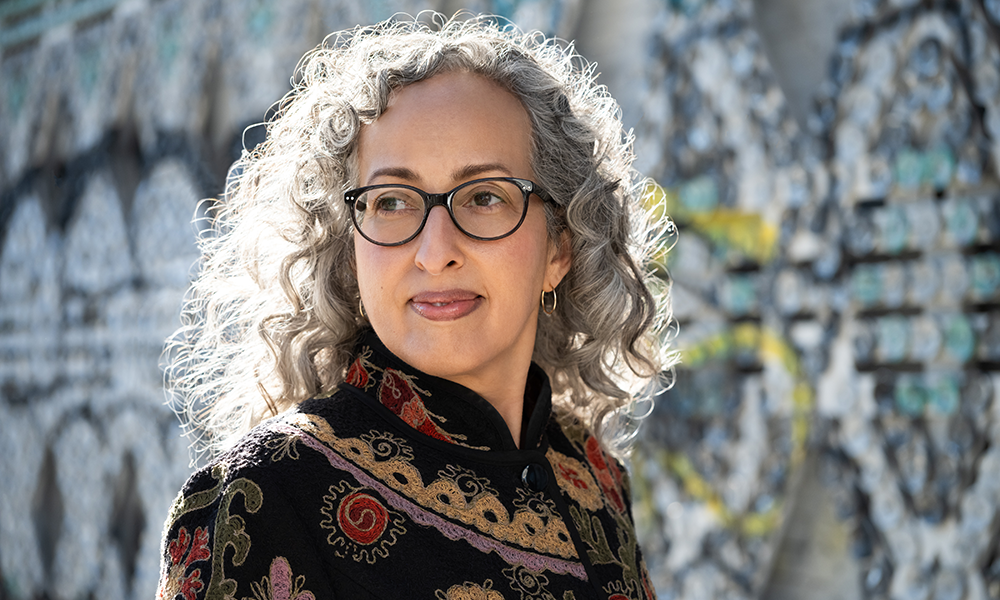Writing the fantastic, scholastic, and real
News
SUMMARY: An award-winning author and scholar, professor Sofia Samatar often finds herself giving advice to students on how to embrace the potential of unique and unexpected career paths.
By the time Sofia Samatar, associate professor of english at JMU, published her award-winning travel memoir The White Mosque (2022), she was already a well-established, multi-genre creative writer. In 2018, she collaborated with her illustrator brother to produce the fantastical Monster Portraits, an investigation of “the monstrous through words and images.” Most recently, her non-fiction work Opacities: On Writing and the Writing Life launched in August 2024.
With these well-deserved accolades in the public sphere, Samatar is simultaneously an engaged teacher and productive scholar of post-colonial and transnational literatures at JMU. In 2024, she earned the Madison Scholar Award, CAL’s most prestigious honor for research, scholarship and creative activities. She regularly teaches courses on Black studies, Arabic literature, world literature and creative writing, and serves on the African, African American, and Diaspora Studies Center Advisory Board. In short, she represents the very best of the teacher-scholar model that CAL values.
In CAL, the term “teacher-scholar” describes faculty who are “actively engaged in advancing their fields of inquiry and are committed to blending teaching and scholarship into a single endeavor.” While JMU recently achieved the new Carnegie Classification of R2 Doctoral University, our faculty remain dedicated to the close student engagement that has been the hallmark of the JMU experience. The students’ direct involvement in the teacher-scholar’s research both enhances student learning and enriches the research itself. Colleagues and college leadership alike appreciate how Samatar embodies that model. “[Samatar] represents the best of what we do in English,” says Becky Childs, and Academic Unit Head. “[She is both] creative and scholarly, inclusive in her work and with an eye towards ways that she can bring her expertise to students.”
For Samatar, who has taught at JMU for almost ten years, directing her energy toward teaching and research helps balance the creative pressures. She knows many people who make a living just by writing, but teaching helps stimulate her creativity and prevent writer’s block while she’s under contract. “Every time I teach a book — I have taught one book, Season of Migration to the North by Sudanese novelist Tayeb Salih for ten years and been thinking about it for twenty — something new comes out of it. A student will notice something that I've never noticed before. That’s the amazing thing about literature.” The students’ unique perspectives suggest new avenues for Samatar’s future explorations.
Similarly, students often turn to Samatar for help exploring their own futures. When they ask how to jumpstart their own writing careers, she finds herself describing her own career path. She always knew she'd be a teacher in some capacity, but the line to her current role was far from straight. Samatar earned her bachelor's degree in English at Goshen College before pursuing her master’s degree at the University of Wisconsin in African Languages and Literature. She then traveled abroad, teaching English to non-native speakers for three years in Sudan and nine years in Egypt before returning to Wisconsin to complete her Ph.D. in the same field. In the face of overwhelming pressure to land the perfect career right after graduation, Samatar assures students that there are many equally valid and life-changing, if meandering, paths to success. “A lot of times people try one way, fail, and think there’s no moving forward, but that is so untrue,” she says.
Samatar’s global experiences contribute to her fascination with speculative fiction, an umbrella genre that describes any departure from realism — including the fantastic, supernatural or futuristic. Her most recent novella, The Practice, the Horizon, and the Chain (2024), is both science fiction and a campus novel, set in a university in outer space. Apart from being fun to read, the dialogue between the familiar and the fanciful in such fiction allows writers and readers to see the “real” world differently, to identify problems and imagine alternate possibilities.
Engaging such other worlds in fiction no doubt helps Samatar and her students bring fresh and creative perspectives to the world. By harnessing the possibilities, from the academic to the personal, teachers like Samatar help students imagine their own promising futures.
